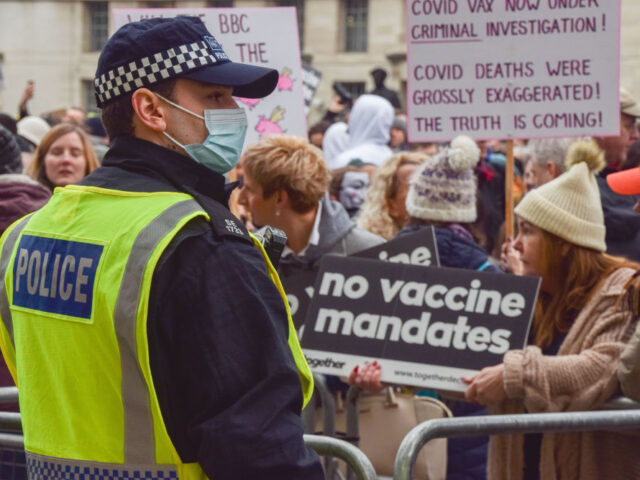Thousands of Britons, most of them younger people, have been given a criminal record despite, as a report revealing the figures notes, the government’s insistence “that it never intended to criminalise people for minor infractions during the pandemic”.
Courts are still working through backlogs of cases years after lockdown ended created by the imposition of notoriously difficult-to-follow coronavirus rules — a matter of fact illustrated best of all by the very people who created the rules having found themselves unable to abide by them — which have criminalised thousands of Britons.
The figures are reported by the Guardian newspaper, which states over 28,000 people have been convicted of Coronavirus rule breaches so far, and that over half of them are of people under 30 years old. It is claimed thousands of convictions have been entered into the police national computer and many others are recorded locally by forces, which can impact the ability of an individual to get a job where background checks are required.
Man in Charge of UK Crackdown on Lockdown Sceptics Now Deputy PM https://t.co/pfbwiOnAKQ
— Breitbart London (@BreitbartLondon) June 8, 2023
The rules broken leading to convictions include even the astonishingly trivial — like forgetting to take the proper paperwork to an airport — and have been exacerbated, the Guardian notes, by special fast-track prosecutions applied to covid cases which critics have said are “watering down justice”.
Per a 2022 report, the so-called Single Justice Procedure (SJP) is a system where “a single magistrate deals with criminal prosecutions based on written evidence alone, deciding whether to convict defendants and imposing sentence in private rather than in open court” which is accused of operating “secretive courts”. As noted by The Standard, “The vast majority of defendants are not legally represented and do not even enter a plea” in a process likened to “conveyor belt justice”.
This system, which has been in action since 2015 and normally used for television licence fee prosecutions and driving fines, was applied to coronavirus prosecutions where no plea is entered by the accused, which — The Guardian claims — led to thousands of people who had not seen the letter informing them they were being prosecuted being dragged into the SJP system by default. This issue may have been exacerbated by the state of postal delivery during the coronavirus lockdown, which became so bad it hit the national news.
Per the report, a staggering 80 per cent of those who were sent letters did not reply to them, meaning they were entered into the SJP court system, leading in many cases to a criminal record.
UK Court Sentences 72-Year-Old To Six Months For Selling Mince Pies During Lockdownhttps://t.co/ouZiVwDk68
— Breitbart London (@BreitbartLondon) November 10, 2022
The government had said at the time that the fines were “light touch” and “clamping down on … but not criminalising behaviour”, yet as the report notes of their research of government court figures, “young people have been severely penalised for relatively minor infractions of Covid rules that have left them with damaging fines and, in many cases, criminal records.”
The United Kingdom experienced, at times, astonishingly authoritarian behaviour by police during lockdown as officers went far beyond the law to enforce their own vision of a pandemic society. Notoriously pettifogging examples — beyond the shutting down of anti-lockdown protests and widespread fines now being revealed — were officers who recorded members of the public exercising in the remote countryside with a drone and published the footage in a bid to shame them, and officers who poured black dye into a waterhole to keep people away.
Big Brother Watch director Silkie Carlo warned in 2020:
…we have just experienced a huge loss of liberty in this country.
And of course, there are justified reasons for it but the way in which this has happened through the passing of the coronavirus act — which is 342 pages rushed through parliament in three days — I watched parliamentarians do this through gritted teeth… one of the most sombre sights I’ve ever seen in parliament. Because these are the most draconian powers we’ve ever seen in this country.
And if you think that police flying drones over parks is excessive, to film and publicly shame people taking their dogs for a walk, that is nothing compared to the powers in that act. Powers to arbitrarily detain people, forcibly test people, potentially thwart protests. Of course, we’ve got to hope these never come to fruition, but that does mean we’re now operating on trust.
Britain Is Turning Into a Totalitarian Police State, Warns Top Lawyer Lord Sumption https://t.co/pLAKQoAYaT
— Breitbart London (@BreitbartLondon) October 30, 2020

COMMENTS
Please let us know if you're having issues with commenting.